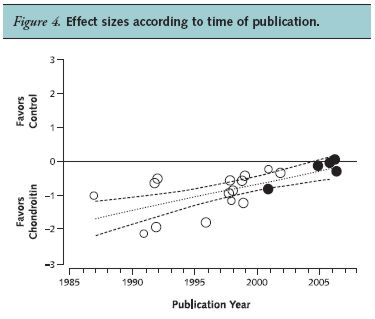Sales of chondroitin and glucosamine are a worth billions of dollars, but the evidence that they work has never been good.
A new meta-analysis of clinical trials now shows that chondroitin on the symptoms of osteoarthritis is “minimal or nonexistent”.
(Reichenbach S and others. Meta-analysis: Chondroitin for osteoarthritis of the knee or hip. Annals of Internal Medicine 146:580-590, 2007: download the paper]
It is the same old story. Early trials were small and badly-designed. They seemed to show some effect, which was wildly exaggerated by the supplement hucksters to push sales. Eventually somebody does the trials properly, and it is found that there is little or no benefit.
Look at Figure 6 from the paper (below). It shows the size of the beneficial effect plotted against the year of publication. The black circles represent trials with a large number (over 200) patients, the white circles are smaller (and mostly badly-designed) trials. As soon as the trials are done properly, the alleged benefits vanish.

The authors conclude “Use of chondroitin in routine clinical practice should therefore be discouraged.”
Analyses by ConsumerLab.com has reported that 8 out of 20 products said to contain chondroitin failed its quality tests, with four containing between 0% and 8% of amount stated on the label.
Glucosamine shows a similar trend. Glucosamine is a synthetic chemical, but it is not a licensed medicine in the UK. It is marketed as a “food supplement”, not as a drug. It is not approved for precription on the NHS. The latest Cochrane review does not entirely rule out some benefit, but again the effects seem to get smaller as the trials get better.
Thanks to Quackwatch for the alert about the Reichenbach paper.


Interesting piece on the BBC site linked to from your miniblog today (http://news.bbc.co.uk/1/hi/scotland/tayside_and_central/7131026.stm).
This is just speculation, but as Glucosamine is normally manufactured in the body (presumably rendering supplemental Glucosamine unnecessary for most people), could it be the source of the Glucosamine rather than the amino sugar itself that caused the allergic reaction? AFAIK, most Glucosamine is derived from shellfish chitin and shellfish can be an MSA (‘Major Serious Allergen’).
The sister of the late Mr Ferrie made a good point – “We feel there should be systems in place to flag up similar incidents” – that has been made by many people in the past (cf the ‘yellow card’ scheme for pharmaceuticals).
No need for speculation, the British Dietetic Association website has had information concerning Glucosamine supplements within the Fact Sheet for osteoarthritis since 2004, clearly stating that people with a fish allergy should avoid taking them.
Sad, how carefully considered, un-biased information on nutritional supplements gets lost in the general marketing barrage.
This has been blogged here: http://awayfromthebench.blogspot.com/2007/12/just-another-example.html with reference to the herbal/amino-sugar mixup by the BBC and Science&Progress makes some good points re quality control and reporting of adverse effects.
[…] go with the flow than to argue about it, but I suspect it’s the same bollocks as homeopathy et al. http://dcscience.net/?p=81 "Sales of chondroitin and glucosamine are a worth billions of dollars, but the evidence that […]
[…] is a waste of money, in my opinion. David Colquhoun of Improbable Science has pointed out that Chondroitin doesn’t work. ["A new meta-analysis of clinical trials now shows that chondroitin on the symptoms of […]
I hear what you say but as an actual person who was recommended to try glucosamine and chondroitin at double recommended daily dose by a NH Rheumatologist while they analysed both blood samples and X-Rays of hands and feet to assess my suitability for Dmards treatment and who, on second appointment a month or so later, told them no I don`t need that poison I can not only tell you that they do, or at least can, work but that taking glucosamine without the chondroitin component provides little benifit.